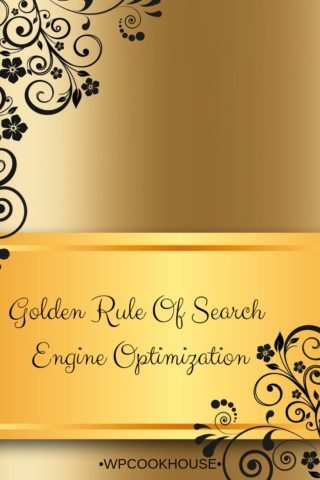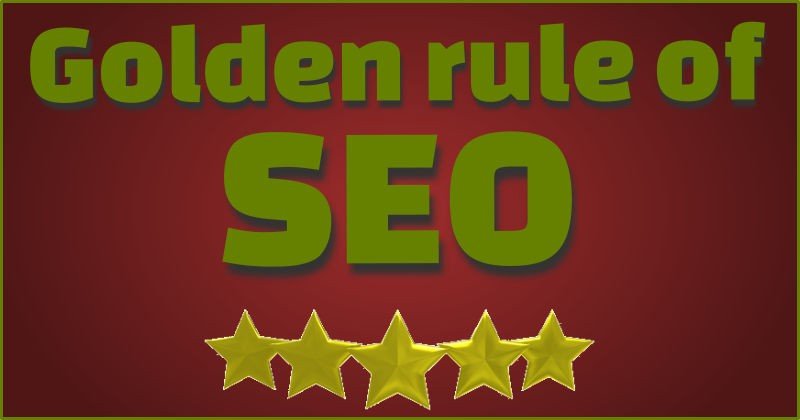There is a sentence only 3 words long that tells everything about search engine optimization. If you know it and apply it, you will be able to achieve unbelievable results even without a SEO specialist. On the other hand, should you omit it, may you use the latest tricks, spend enormous amounts of money on your internet marketing, you’ll still trail after your competitors.

A Story 16 years old
But before unveiling the golden rule of search engine optimization, let me share a story that started on September 4th 1998. This is the story of search engine giant Google that is one of the biggest companies in the world (their income for 2013 has been USD 55 billion, a gigantic sum for most entrepreneurs).
In the deranged internet era of the 90’s when search engines displayed those webpages first that paid more, founders of Google undertook to oppose the flood. They worked out a method to measure the popularity of websites.

If anything was entered into their browser, hits were displayed in the order of how useful they were for the searcher. So if you looked for “dog grooming”, these Google boys would not display dog cosmetics and dog shampoo manufacturers paying lots of money, but websites that would be relevant for the average people the way their pets could be groomed.
This new method of theirs succeeded, more and more people started to use Google, founders made a fortune out of that search engine. Sooner or later also their competitors started to separate pay and no-pay advertisements. Today no one would imagine a webpage appear on the top of search results for having paid much money for it.
This new method applied by Google in the late 90’s more or less meant that the more link pointed to a webpage from other webpages, the more popular it was so the more forward it had to be displayed in the search results. Therefore, search engine optimization (SEO) meant at that time to obtain links. This started off a cat-and-mouse game between search engines and website owners. Link directories, webpages offering links for money and link farms etc. were born.
Though, Google accepted the challenge, and have been refining their method for 16 years. The thing that drives them is to provide surfers the most useful webpages. (This, however, is so true that even the price of Google pay advertisements depends on how the ad and the advertised landing page fit the keyword.)
The Golden Rule of Search Engine Optimisation
Nevertheless, let’s get back to the golden rule of search engine optimization, i.e. the sentence I mentioned in the beginning. I don’t know who had invented it, I read the original on Viperchill.com. This one sentence, in my opinion, includes everything any website owner has to know about search engine optimization as a zero step.
It goes like this: „Google follows people”.
What is this one short sentence about to say? And what does this mean in reality?
Google was able to keep its supremacy in the murderous battle only in one way. They set all of their tools to guess what average people needed. What one would like to see when searching for “dog grooming” or “biscuit recipe” or “accommodation Italy”.
The essence of their perfectly polished method may be summarized in this one sentence: “Google Follows People”. If a site is visited by many people, if visitors get back often, if many links point to that page and it has lots of social media shares and likes, that makes a website good. And it also makes search results good.
Should one understand this single sentence, they would be able to create a homepage from their own source without the help of any search engine optimizing specialist that would end up being displayed on a prominent place.
How May You Apply the Golden Rule of SEO on Your Own Website?
When designing or planning your site, when writing a new page or blog entry, raise yourself the question: What do people wonder about? What do they need?
If you find the answer for these questions, you may kill two birds with one stone: you may offer an interesting content on your homepage and, sooner or later, you will be included in search engine results. In that way, you’ll get visitors without any extra marketing cost.

What Does Really Work in SEO?
Let’s enumerate what those methods are that, according to the “Google Follows People” principle, you may apply as a “home-made” search engine optimization, even immediately.
- Have an interesting website. You don’t have to write about celebs or theetie-weetie pets, but at least make it attracting for your target audience that they may find at your site. Write about things your customers are interested in. Their problems, their possible solutions, their opportunities. How they may make their lives easier and better by using your product. How their troubles would disappear by employing you.
- Be beneficent. Offer valuable, free information your readers may use for their benefit. A visitor you have tied to yourself by your useful tips is much more worth than hundred others who happen to visit your website but never get back again.
- Develop your website for your readers. There is no worse thing for a customer or a visitor than being lost among pages like “About Us”, “Contact”, “History of the Company” or “Link Partners”, without being able to find what they came for. Make the most visited pages be easily accessed in your menu. If possible, ask your customers if they have found what they had been looking for. (Tip: apply Avinash Kaushik’s great exit survey to achieve this without even having to ask anyone.)
It has been right today that I searched the webpage of a mobile company to find the documents required for the conveyance of a contract. Shamefully, I had no other choice but to contact Google, for neither their menu, nor their search application could offer the answer. In case you are not an enormous mobile company, will your leads dedicate so much time to you?
- One page – one topic. Today we are living in a superfast world. One who is searching for something, wants to get the answer right away. They don’t want wade through fifty paragraphs until they find the answer. Therefore, it is utterly important to dedicate each of your pages to one topic. Should one be not interested in it, will not click on it. But those who are, will not be lost in the sea of eclectic information.
- Write about funny tales and interesting stories. Any company has moments that would be good things to laugh at later. If you write about these and you compile them on your webpage, your visitors will stay longer and visit more pages. This means a higher chance towards selling, and would also benefit your search engine position.
A funny story is not the easiest thing to compose as far as search engine optimization is concerned, but let me tell you a tip: more than 60,000 people search for “funny stories” a month. If you write 4 or 5 of them and place each of them on a separate page, you will be able to obtain 4 to 5 extra visitors a day only by using the keyword “funny stories”.
- Publish as many as you can. An abandoned webpage would attract no visitors anymore. Why would anyone return for the sake of finding the same things again? In addition, the more pages you have, the more keywords you can rank for. And this even offers you more opportunity to have other webpages link to your site.
In these days, it is super easy to launch a blog. There are several free softwares to help you make it. You may write about anything that comes into your mind. About a product, the success of a customer using your product, about your mood that day, the trade fair in Germany you visited last week. The point: write, write, write!
What Not to Do
- Don’t let your website talk only about you. I’m sorry, but you and your company are not in your customers’ interest. They are interested in their own problem, their own opportunities. Just think it over: if you want to change your mobile service provider, what are you interested in? The number of transmission towers and personnel each one has, or the aspect concerning which of them is cheaper while offering the best quality?
- Don’t expect your website to talk about everything. Should your company deal with ten completely different products, it is quite difficult to demonstrate on one site as far as SEO is concerned. What is your site about? Foreign travels or the sale of alkaline mineral water? (It may be funny, but these two topics mixed were a real life example taken from an existing website who’s owner contacted me if I could do him SEO).
These kinds of websites with mixed content would not be easily identified neither by visitors, nor by search engines, so they better avoid them. In case you want to advertise several dissimilar products, reserve them separate domains aka niche sites. Believe me, it is going to be worth on the long run to invest a little bit of extra work and cost!
- Don’t put more than one product or service on a page. There is nothing worse for someone searching for furniture to find a page introducing twenty-five different beds, each of them introduced in the very meticulous details. What do you think the chances are that they would purchase anything?
Organize your products into categories, like ‘beds’. Create different category pages and make the pages of each product available from there by one click. This may require some knowledge of programming (or using a great CMS like WordPress), though the usability and the number of procurable extra visitors is really worth the cost.
- Don’t use trickery. Search engines may be tricked for a while – visitors may not. Those who want to rank by trickery surely don’t develop their webpages for the real good of their visitors. (By trickery I mean: with bad intention and deliberately in order to reach better search results, placing things on your site that visitors may not see, may see otherwise or consider unimportant, aka black hat SEO).

What Should Be the First Step in Optimizing Your Website?
If you may not or wish not pay an SEO expert, help yourself by making these simple steps before the week is out:
- Ask 20 of your customers what their problems were that your product or service could help them most.
- Choose the one item of them that is most often mentioned.
- Chose the one page out of your site (or create a new one if there is none) that deals with this very problem. From your customers’ point of view, describe how this problem may be prevented or solved in case they choose you. Write at least 400 words, and use the designation of the problem (i.e. the keyword) at least 4 times in the text and 1 more time in the title.
- Make this page reachable by just one click from your homepage, e.g. make this a menu item.
- Spread the link of this page with a short caption text to as many places as you can (that is, do some link building). If you run a newsletter, send it there. If you have a customer register, there. Post it on as many social media pages ad you can. Send it inevitably to your acquaintances and suppliers.
These steps would not make you a millionaire, though you may achieve two things. You immediately attract visitors to your webpage (not necessarily from search engines) and they may, who knows, purchase something.
And if you address a problem that interests many people, sooner or later you will appear in the search engines, and, as a result of your work, attract brand new visitors day by day.
What do you think?
What experiences do you have with SEO? Did you find it useful sometimes not to focus on meta tags, html headings or other hocus-pocus but just on delivering useful content to your readers? I’d love to hear your opinion, please share with us below!

